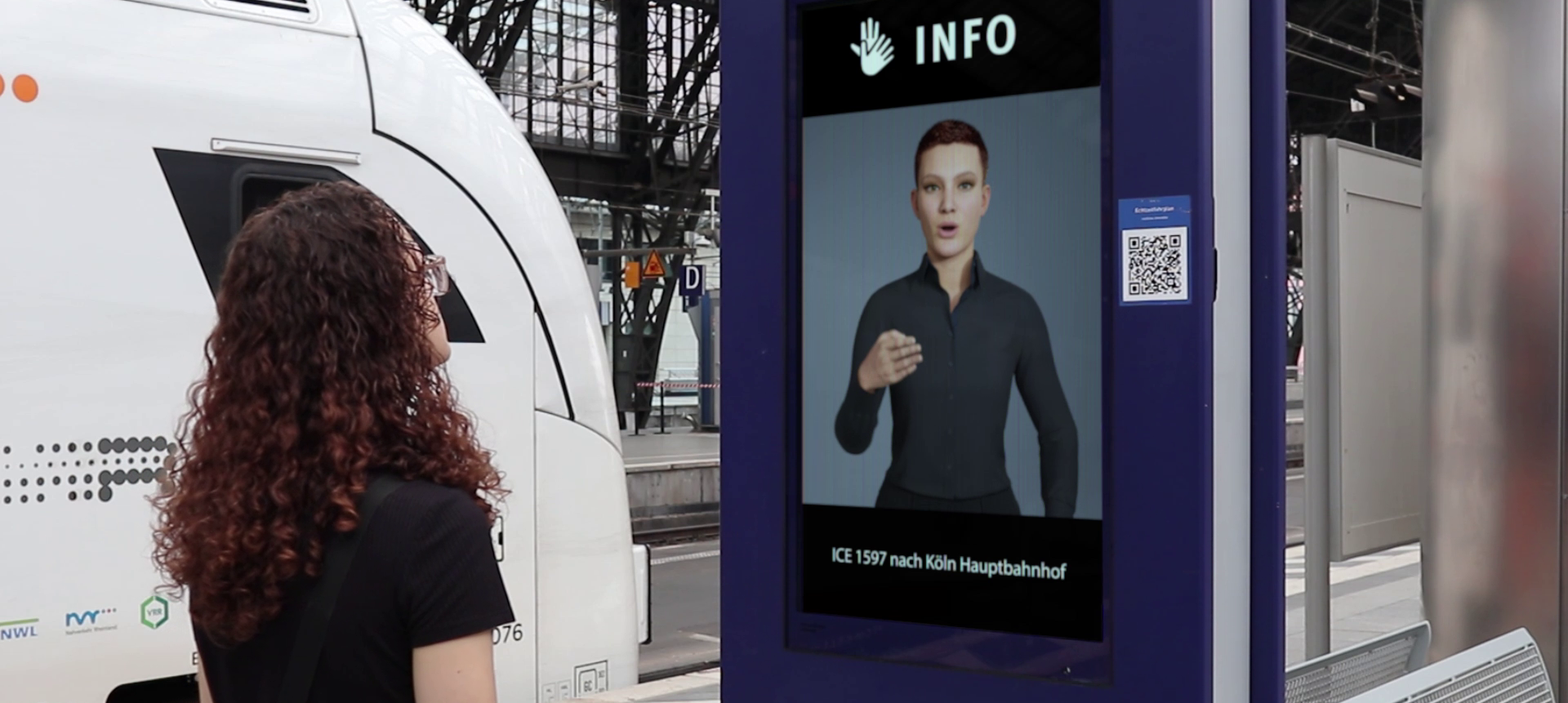Sign language avatars in Business Punk Check

Avatars communicate with their hands – AI enables deaf people to participate online
The German-language business lifestyle magazine “Business Punk” for a young target group focuses on entrepreneurship, innovation, trends, digitalization, and start-ups. The magazine profiles “movers and shakers” and now reports on alangu, taking a close look at sign language avatars in 7 thematic sections:
1. When written text becomes a foreign language
2. AI as a language bridge
3. Digital inclusion as an economic factor
4. Between pioneering spirit and criticism
5. E-commerce as the next step
6. Business Punk Check
7. Frequently asked questions
Click here for the article by the Business Punk editorial team (German):
www.business-punk.com/startup/wenn-avatare-mit-den-haenden-sprechen-ki-gibt-gehoerlosen-stimme-online
Here is our summary:

In its article “When avatars speak with their hands – AI gives deaf people a voice online” published on September 11, 2025, Business Punk magazine highlights how AI-supported sign language avatars are revolutionizing digital communication and could, for the first time, fully integrate hearing-impaired people into the digital world. While digital administrative procedures and online shopping are part of everyday life for many people, the hearing impaired often face insurmountable hurdles.
1. When written text becomes a foreign language - Just over 80% of deaf people are unable or only partially able to understand texts contextually, as written language is learned through sounds. For them, sign language is their mother tongue and written language is a foreign language. More on this: Why is sign language translation so important?
2. AI as a language bridge - alangu is developing a modular system to translate websites into German Sign Language (DGS), incorporating feedback from over 160 customers nationwide and the deaf community, using innovative approaches:
a) How is a sign language avatar video created? Motion capturing, 3D animation, and a great deal of expertise...
b) How does quality assurance work at alangu? Every detail counts in the multi-stage process...
c) How do we teach our AI sign language? The AI learns step by step through annotations...
3. Digital inclusion as an economic factor - With an aging population, the number of people with hearing impairments in Germany continues to rise. The city of Fulda, which has been supporting the alangu project since 2022, reports here on its pioneering role (German).
4. Between pioneering spirit and criticism - In addition to the advantages of scalable modular technology, there is also a glaring shortage of qualified German Sign Language interpreters, which argues in favor of the supportive use of sign language avatars. alangu takes all criticism very seriously and welcomes, for example, the 15 principles in the EUD's (European Union of the Deaf) Ethical Framework on AI and Sign Language.
5. E-commerce as the next step - In addition to local authorities and other public bodies, as well as financial service providers, insurance companies, education providers, and other stakeholders, now also benefiting is e-commerce - for online shops new markets are opening up. In addition to fulfilling legal requirements, alangu software makes it possible for the first time to quickly, easily, and cost-effectively provide videos in German sign language digitally and keep them up to date.
6. Business Punk Check - Beyond being a benevolent inclusion project, AI avatars are economic policy for a billion-dollar market that has been digitally left behind until now. While legal frameworks only set minimum standards, early adopters such as alangu are creating real market advantages, according to the Business Punk editorial team. The shortage of skilled German Sign Language interpreters makes human solutions unaffordable in reality, so AI is the only scalable solution here. According to the Business Punk editorial team, pioneers who are now turning to software and investing in alangu are not only securing CSR points, but also tapping into an unsaturated market with high purchasing power and loyalty potential.
Click here for the article by the Business Punk editorial team (German):
www.business-punk.com/startup/wenn-avatare-mit-den-haenden-sprechen-ki-gibt-gehoerlosen-stimme-online
7. Frequently asked questions - Answers summarized below:

• What economic advantages do AI sign language avatars offer?
Pioneers are tapping into a previously inaccessible billion-dollar market with cost efficiency, updatability, and competitive advantage through early implementation, especially in e-commerce.
• How do small and medium-sized enterprises benefit from sign language AI?
By participating in the alangu modular system, which can be integrated into websites, they benefit beyond the legal minimum requirements to secure market share and position themselves as inclusive pioneers.
• Which industries benefit most from AI sign language technology?
Currently, local authorities and other public bodies, as well as financial service providers, insurance companies, education providers, and other players, and e-commerce / online shops are benefiting by explaining their content, services, and products in an accessible way, thereby tapping into new target groups. According to the Business Punk editorial team, early integration into the digital strategy is crucial in order to minimize development costs and maximize market advantages.
• How can cultural concerns of the deaf community be addressed?
As stipulated in the EUD's “Ethical Framework on AI and Sign Language”, alangu involves deaf people directly in the development process. Feedback mechanisms, continuous technology adjustments, and transparent communication build trust - at alangu, for example, through regular free informational webinars (register here, in German), on-site trade fair appointments and online software demos (register here), current blog articles, and inclusive social media channels such as Instagram @gebaerdensprachavatar or alangu-LinkedIn.
• What regulatory developments can be expected following BITV 2.0 and BFSG?
Following BITV 2.0 (Barrier-Free Information Technology Ordinance) and BFSG (Barrier-Free Accessibility Act), further tightening of accessibility requirements is expected. The EU Commission is already planning to extend the requirements to other digital services. Those who opt for flexible, AI-based solutions now, i.e., those who choose the software and invest in alangu now, will be better prepared for upcoming regulations.
Click here for the article by the Business Punk editorial team (German):
www.business-punk.com/startup/wenn-avatare-mit-den-haenden-sprechen-ki-gibt-gehoerlosen-stimme-online
